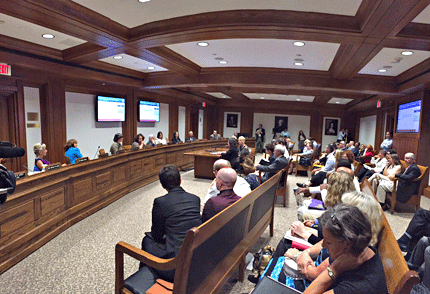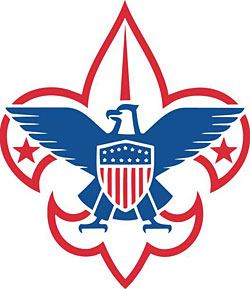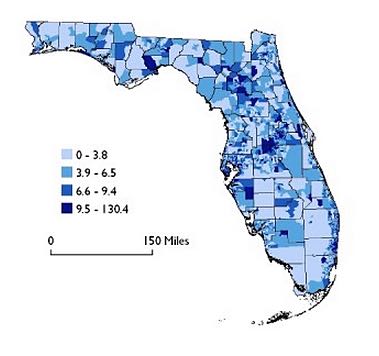By: Chris Azzopardi*/Special for TRT–
Everyone’s talking about Rebel Wilson, the scene-stealer in Bridesmaids who played Kristen Wiig’s trashy roommate and mistook her live-in’s diary for a “very sad, handwritten book.”
The Australian breakout star has already had two other roles earlier this year with What to Expect When You’re Expecting and Bachelorette; her pilot for the ABC series Super Fun Night also just got the green light. Now she’s Fat Amy, the I-am-who-I-am collegiate mermaid dancer in Pitch Perfect who gets all the boys and belts her butt off as part of an all-girl a cappella group.
Sprawled on a couch all cozy-looking in a track jacket and hand bling that spells out her name, Wilson – along with out director Jason Moore, whose first film is Pitch Perfect – chatted in her dry-wit way about stealing the role from Adele, why the gay community will find Fat Amy empowering and her tips for killing an a cappella audition (hint: Lady Gaga).
Q. This is a gay press interview, so all of these questions will be very gay.
Rebel Wilson: Oh, cool. It’s a pretty gay movie. You’ve got a lesbian character, and I think most of the Treblemakers, the boy band, are gay. What about that scene where there’s, like, nine dudes in a hot tub … naked? That’s totally gay.
Q. The gay community can be fickle about gay characters. Did you worry about portraying the lesbian character a certain way so it wouldn’t come off as stereotypical?
Jason Moore: I don’t know what you’re talking about. (Laughs) In a way, we were looking at all stereotypes. So yes, she’s a lesbian and they mistake her for a man at the beginning – but also, she’s got this beautiful shock of hair, she is quite fun and feminine in the way she moves; she’s got an amazing voice and she’s not afraid to be herself in the world. Are lesbians going to take offense to that character? I don’t think so, but we’ll ask them.
Q. You’ve really got the belting down, Rebel. Are you ready for the Adele comparisons?
RW: You know, interestingly, when they were casting this, they were looking at Adele to play Fat Amy, because obviously she’s an amazing singer and this is a musical film. They were going to make a decision on whether they should go with a comedy person like me or a singer-singer. I was so glad they went with me.
Q. Well, you hit that one really high note.
RW: Yeah. That’s really hard. That’s higher than a lot of the Wicked notes. (Laughs)
Q. What are your tips for gay men who want to pursue a career in a cappella?
RW: You just gotta be committed, even if you’re not the best singer. Then they’ll see your confidence and they’ll be like, “That dude is pretty fly. He’s such a great dresser as well, so he would be a great asset to our group.” Also, choose your audition song wisely. I chose Lady Gaga’s “The Edge of Glory” when I auditioned for this movie. And I did my own body percussion.
Q. Why no Lady Gaga song in the movie?
JM: That’s a good question. I won’t lie, Glee had already done a Lady Gaga show and had done it really well, so how do we choose songs that maybe could be unique to our movie?
Q. What are your gay roots, Rebel?
RW: I started out in the theater, and obviously, in Australia, we say it’s run by the gay mafia because all of the super-talented actors and directors are all gay – and so I have a lot of gay guy friends. Just in real life, generally. And I live with a super famous gay man, Matt Lucas, who is just a comedy genius. We’ve been having so much fun. He’s friends, also, with a lot of gay men who come around to the house. (Laughs)
Q. In the movie, you have really great gaydar.
RW: Because there are 10 of us girls in the group, and so odds are at least one of us has to be gay. Yeah, I just improvised that scene; it wasn’t even in the script. I picked Ester Dean’s character. Turned out I was correct. (Laughs)
Q. Is your gaydar that good in real life?
RW: Gay guys are easier to spot. It’s harder to spot lesbians for some reason, unless they’re super obvious.
Q. Like, in a flannel shirt?
RW: Yeah, real butchy. Then you’re like, “Oh yeah, definite.” (Laughs) Lipstick lesbians, it’s hard. You wouldn’t know.
Q. Jason, what drew you to this story?
JM: I love Sister Act, I love Mean Girls, I love Heathers and I love Bring It On. Those movies are all about people who are obsessed with things, whether it’s popularity or cheerleading or becoming the best choir they can be. You get these underdogs and weirdos that come together to form a group and make music, and they become rock stars for a minute.
Q. Why are you drawn to the outsider role?
RW: I always think of myself as an underdog. I’ve had to prove myself and be, in some cases, twice or triple as talented as other people, purely because I think I came from a lower-class background in Australia and no one from where I lived was a huge movie star. I thought I looked more like a normal girl, but then, weirdly, I’ve just stuck to what I am and Hollywood has found that quite refreshing – that I just was different. Then I marched through the doors of my agency and was like, “Heyyy, I’m Rebel! I’m an actress!” They thought I was really different from all other girls out there. I’m never the alpha one; I always feel like the underdog trying to achieve something.
JM: The underdog story, the outsider story – all humans are drawn to it, but certainly being a gay man, there’s a gay sensibility about being an outsider: “Do people understand me, and if I express myself, will people love me?” And Fat Amy is a great character. She says, “This is who I am, and I own it, and fuck all y’all if you don’t like it.” There’s a great message for anybody who feels like an outsider – which, as we know, is everybody.
I grew up in the South and I knew fewer gay people than if I might’ve lived in an urban area. I’m definitely drawn to people who are looking for their place in the world. Avenue Q is about a kid looking for his place in the world; it’s also about puppets – monsters – that are prejudiced, which is an outsider message (Moore directed the original Broadway version). And Shrek is about an ogre who is ostracized because no one understands him (Moore directed Shrek the Musical on Broadway). So I am drawn to those stories.
Q. Tell me about your role in the Chris Colfer movie, Struck by Lightning.
RW: I play his best friend. That character is totally different than mine in Pitch Perfect because it’s based on Chris’ real friend, who I met on the first day of filming. She’s a real interesting character. In high school, she tried to pass off classic novels as her own work. (Laughs).
It was so great to work with Chris; he wrote that movie as well as starred in it, and I, of course, love his character on Glee and thought he was great. Just to work with him – he’s such a great young guy, and super talented. I think he’s got a future in directing and writing.
Q. How do you think the gay community will find Fat Amy empowering?
RW: Because even though she might be flawed, Fat Amy just exudes confidence – and she doesn’t really care what other people think of her. Some people might say she’s not the best singer, she’s not the best dancer, but she just comes out and is like, “Whatever. I’m loving it. I’m just gonna be proud and be myself.” Whenever I was on stage performing in the movie, I had to really keep that in mind the whole time, so that’s why I think she’s such a lovable character.
JM: I think a lot of gay people will find her role empowering. That’s the point. She was always called Fat Amy, she owns her body, she’s beautiful, she has lots of boyfriends; she’s a take-no-prisoners, fearless-type of woman, and Rebel embodies that.
Q. What was it like working with Jason?
RW: I was quite nervous to meet him, because he’s the real-deal Broadway director and then he just let me have so much freedom and do whatever I wanted. He’s just got such class, and this is his first movie and it’s frickin’ funny. He gave me these words to describe my character and I wrote them down on a piece of paper and had them in my jeans when I was filming every day: cocksure, confident, the instigator, loyal – that was a good one. So I would just look at those if ever I was stuck. And I did a lot of improvising in the movie; if ever I was stuck, I would look at those words and think, “I’m going to be really cocksure in this take.”
Q. Are you aware how much gay men love you?
RW: Aww, that’s awesome. I do live in West Hollywood and I do feel very safe on the streets. (Laughs) It’s so nice, though. I love playing all sorts of characters, but gay guys in particular seem to like my characters – and my writing.
Q. As a gay man, Jason, did any of your gayness rub off on the movie?
JM: How could it not, first of all? Everything I touch turns to unicorns. (Laughs) I always worry about the gay sensibility. In the end, there was one lesbian character in the movie and I love the message that sends. Everybody else is trying to negotiate that fact that she’s gay and she’s like, “Yeah, that’s my girlfriend.” Again, she owns it. As they discover who they are and become more empowered through singing, that’s part of the message. And, you know, to keep it interesting we put some guys in a pool.
Q. Did you feel like one of the girls on set?
JM: There were times when I kind of wanted to be one of the girls. I love women, I feel comfortable around them and it’s fun to make them look beautiful. As a group of women in this story, they have such heart and they form a bond in such a special way. At the same time, I was also very aware that I wasn’t a woman. I don’t know what it’s like to walk in high heels. Well, not really. I sort of do.
*Chris Azzopardi is the editor of Q Syndicate, the international LGBT wire service. Reach him via his website at www.chris-azzopardi.com.









